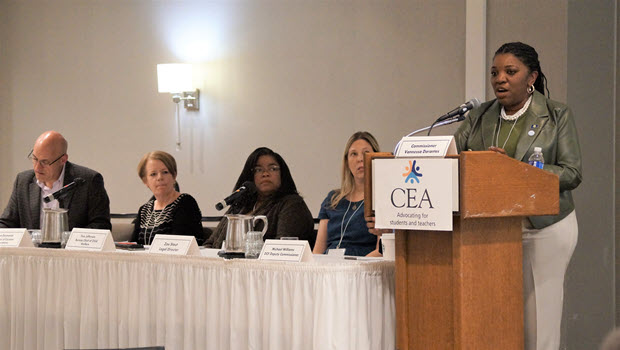Back in October 2019, then recently appointed Commissioner of the Department of Children and Families Vannessa Dorantes and her leadership team joined CEA for a Q&A with local union leaders. It was the first time a DCF commissioner had sat down with Connecticut teachers and solicited their input into the DCF process—but it wouldn’t be the last.
Last night Dorantes, now four years into her job and having weathered a pandemic, again joined CEA local and state leaders for a candid conversation about what’s working when it comes to the teacher-DCF relationship and what still needs to be improved.
“We’ve seen an evolution over the last few years,” CEA President Kate Dias said. “We’re in an interesting space where we’re redefining how we engage and how we get kids the support and services they need. There are still failure to report concerns, there is still a weaponizing of DCF against teachers, but we are working together to find common ground.”
Dorantes, who was joined by a panel of DCF staff, told CEA members gathered at the Sheraton in Rocky Hill that when she met with them back in 2019, she heard that educators wanted DCF to change and adapt. “We made certain promises back then. Today we have an opportunity to talk about which of those things we’ve been able to make come to fruition.”
Among the improvements that Dorantes and her staff cited as having occurred following the 2019 meeting with educators include
- Relationship building – Dorantes said that, back in 2019, one of her goals was to rebuild what had become a tense relationship between DCF workers and educators. Not only have DCF leaders been in frequent contact with CEA leaders and staff, but Dorantes said relationships have improved at the local level as well. Some DCF employees are assigned as liaisons to larger schools and can provide support when questions come up. She urged union leaders to reach out to their local DCF office and form relationships with staff there so that it’s easy to reach out when questions or concerns arise.
- Dedicated DCF team for schools – Before Dorantes’ tenure as DCF commissioner, there was little consistency across the state in how school employees who had a complaint filed against them were investigated. Dorantes and her team instituted an Educational Investigation Unit which now has a team of twelve who take on investigations of all school employees as well as bus drivers, daycare employees, and camp staff. Lisa Daymonde, director of careline operations, said that she thinks the team has been able to provide consistency and collaboration. “I think it’s been very effective,” she said.
- Online portal for reporting non-emergency issues – Dorantes said that DCF had been piloting an online portal for non-emergent reporting when she talked with educators in 2019. Daymonde said that DCF found that “educators were making some pretty smart decisions about what was immediate and what was something that could be made through the portal.” DCF found that very few reports made online should have actually resulted in a call. “In fact, we learned so much from the pilot with educators, we expanded the portal to all mandatory reporters effective June 6, 2022.” The DCF leaders said that the portal has dramatically reduced call wait time, once a major complaint of educators.
- Updates to the online portal – Daymonde said that a recent update to the online portal allows educators to start an online report, save it, and come back within 12 hours to finish the report, allowing educators time to find supporting information without losing the information already entered. The portal now also allows educators to print a copy of the report before it is submitted if they want to keep it for their records and allows attachments so that teachers can upload attendance records and other documents. DCF has also added a pop-up feature that provides help tips.
- Preventative support for families – Sometimes educators call DCF because they know a family is in need and don’t know how else to get them help. DCF Bureau Chief of External Affairs Ken Mysogland said that connectingtocarect.org allows educators to put in the name of the town where a family lives and find a list of behavioral health supports available. He said that by the beginning of the next school year, they hope to have in place a care management entity (CME) that will allow educators to call and refer a family in need of support. The CME will then take the referral and reach out to the family to connect them with services. By making it easier for families to get services, Mysogland said DCF hopes that there will be fewer incidents of abuse and neglect.
- Documenting DCF’s busiest times – When it comes to calling the careline, DCF leaders said that the months with the highest number of calls are October and March, the peak day for calls is Tuesday and the top time is 2 p.m. Dorantes said this information can help educators know when they can expect to face longer hold times. She also said that just as the teaching profession is facing a shortage, so is DCF, and to have patience when calling.
“You have the strongest advocates for you at CEA,” Dorantes told educators. “Even though you’re seeing me in front of you for the first time since 2019, you should know that my office and CEA have had regular conversations throughout the years.”
Dias thanked Dorantes and her staff for their willingness to address the issues facing teachers, listening to their concerns, and working toward providing clear information, resources, and guidance on how best to support students and their families.







